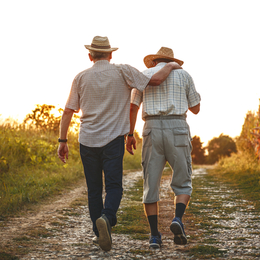
Not Alone
When life throws a curveball, friendships can sustain us.
The email took the breath from my lungs.
A close friend wanted me to know about his regrettable health diagnosis: a terminal disease that, if left untreated, would shorten his life. Furthermore, he told me he would forgo the difficult treatments that could extend his life, opting for other ways to battle the disease.
I should mention that my friend is in his early 60s—far too young to leave the earth.
He told me he was neither afraid nor forlorn, because he had lived a very full life and had amassed a large contingent of people who loved him. In his mind, he had done it all, so he would be at peace with whatever happened next.
He told me he was neither afraid nor forlorn, because he had lived a very full life and had amassed a large contingent of people who loved him. In his mind, he had done it all, so he would be at peace with whatever happened next.
My friend’s health situation underscores one of the many positive effects of friendship: Being engaged in a friend network can help us contend with significant life events that may occur as we grow older, per a 2019 research agenda published by Oxford University Press on behalf of the Gerontological Society of America. As challenges arise—illness, the loss of mobility, the death of a spouse or loved one—our friends may help sustain us, console us through our grief, and keep our feet rooted to the earth.
Friendships and other forms of social engagement also lead to improved physical health, a strong sense of belonging and purpose, and better mental health. A study published by Harvard Health suggests that a strong social network as we age can even help us live longer.
On the other hand, people who suffer from loneliness or social isolation are 29 percent more likely to develop coronary heart disease and 32 percent more likely to have a stroke than those who were socially engaged, according to a 2018 study published by the Mayo Clinic and Olmsted County Public Health Services on behalf of the American Heart Association. Other negative effects that may result from the lack of friendship in one’s life: a higher incidence of chronic disease and depression; a greater risk of developing cognitive decline and dementia; and greater vulnerability to scams and other forms of abuse.
Making friends seems easy as pie for children and adolescents. As we age, however, we often find ourselves increasingly distrustful of others, and the opportunities to form friendships seem sparser. The temptation to isolate ourselves intensifies as a result.
In 2023, making friends is both easier and more difficult than ever. We are increasingly polarized and isolated, yet social media enables us to track down others who share our interests—or simply share an interest in making a connection with someone else. Where we live seems to matter a great deal; over the past 10 years, I have interviewed dozens of older men and women who say their lives changed for the better when they moved out of their family home and into a continuing care retirement community, where social interaction is “baked in.”
As for my friend, he seems to be in good spirits. He’s enjoying retirement in North Carolina, working out like a fiend, and trying not to think too much about the challenges ahead. During a recent text exchange, we made plans to meet up for a few beers when he comes north in November.
Published (and copyrighted) in Suburban Life, September 2023.


